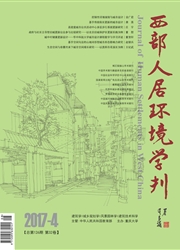

 中文摘要:
中文摘要:
通过对重庆市第一批2 0个历史文化名镇保护实施过程的调查研究,发现多数历史文化名镇保护的问题在于统筹意识较弱、保护的关系定位不明、保护的法规不完善、保护的组织管理欠缺、"保存"与"保护"的关系不明等,导致历史文化名镇保护走向两个"极端",一是历史文化城镇保护思维简单化,消极"保存",欠缺发展动力,历史文化城镇逐渐衰败;二是历史文化城镇保护措施商业化,过度"保护",过度追求眼前利益,各种商业、旅游开发逐渐侵蚀了历史文化本身的价值。研究提出建立实施效果评价模型予以监控、反馈以及修正保护过程中存在的各种误区。模型以"保存"与"保护"协调发展理念为引导,科学反映历史文化城镇保护中"保存"与"保护"的影响因子。评估模型能真实、有效地反映历史文化城镇政府在"保存"与"保护"方面所做的努力,为管理部门把握历史文化城镇的保护情况提供科学依据。
 英文摘要:
英文摘要:
Through the investigation and study of the first batch of historical and cultural towns in Chongqing, it's found that there exist many problems in the proctection of historical and cultural towns: weak overall planning awareness, unknown position of protection, incomplete protection regulations, and a lack of the protection organization and management, unclear relationship between "preservation" and "protection". All of these factors lead the protection of hisotrical and cultural towns to two extremes: one is that the simplistic thinking of protecting historical and cultural towns results in protecting negatively, lacking momentum, and historical and cultural towns gradually dilapidating;the other is that protection of historical and cultural towns tends to be commercialized,overprotection with excessive pursuit of immediate interests, and a variety of commercial,tourism development have gradually eroded the value of history and culture. Therefore, the paper proposes that it should establish the protection mechanisms to monitor, evaluate, give feedback and correct the errors in the protection process. The implementation evaluation model takes the concept of coordinated developmemt of preservation and protection, gives a scientific response of the various influencing factors of protecting historical and cultural towns. The evaluation model can truly and effectively reflect the efforts that government make in the preservation and protection of historical and cultural towns, and it's expected that it will provide scientific evidences for the management department to grasp the protection of historical and cultural towns.
 同期刊论文项目
同期刊论文项目
 同项目期刊论文
同项目期刊论文
 期刊信息
期刊信息
